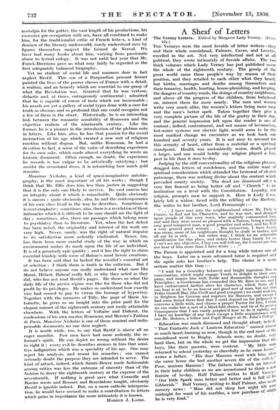Restif de 1 a Bretonne
Monsieur Nizholas. By Restif de In Bretonne. Edited by Havelock Ellis. ft vols. ( Vols. i-iii, John Rodker, £15 15s.) Trio: brings its curious revenges. Save for a partial selection from one of his early works, nothing of Restirs has so far appeared in English, though it is a century and a quarter since he died. Now Mr. Rodker is printing his greatest book in six nobly produced volumes (of which the first three have just appeared) with an admirable preface by Mr. Havelock Ellis.
They are a superb piece of typography, and the illustrations could not be bettered. No one can really understand the French eighteenth century who has not read this book. No one would wish to read it in a more admirable translation.
About few writers have opinions differed so widely. To Sainte-Beuve he was simply ignoble ; and in Lanson's classic, history of French literature he has no more than a con- temptuous half-line. His colossal vanity, his inescapable nostalgia for the gutter, the vast length of his productions, his excessive pre-occupation with sex, have all combined to make him, for the traditionalist critic of French letters, a kind of denizen of the literary underworld,- rarely understood save by figures themselves suspect like Gerard de Nerve!. We have had many books about him, varying from passionate abuse to lyrical eulogy. It was not until last year that Mr. Mack-Brentano gave us what may fairly be regarded as the first adequately balanced biography.
Yet no student of social life and manners dare in fact neglect Restif. This son of a Burgundian peasant farmer painted the lives of the poorer classes of France with a detail, a realism, and an honesty which are essential to our grasp of what the Revolution was. Granted that he was verbose, didactic and, at times, outrageously sentimental ; admitted that he is capable of errors of taste which are inexcusable ; his novels are yet a gallery of social types done with a care for truth so obvious and so profound that one could recognize not a few of them in the street. Historically, he is an interesting link between the romantic sensibility of Rousseau and the objective realism of the nineteenth century. Like the former, he is a pioneer in the introduction of the plebian note in letters. Like him, also, he has that passion for the moral instruction of his age which created a new sort of religious emotion without dogma. But, unlike Rousseau, he had a devotion to fact, a sense of the value of describing experience for its own sake, which made almost everything he wrote an historic document. Often enough, no doubt, the experience he records is too vulgar to be artistically satisfying ; but amidst the occasional dross, it is astonishing how much gold remains.
Monsieur Nicholas, a kind of quasi-imaginative autobio- graphy, is the most important of all his works ; though I think that Mr. Ellis does him less than justice in suggesting that it is the only one likely to survive. Its vast canvas has an integrity about it which is remarkable. Quite obviously it is sincere ; quite obviously, also, he and the contemporaries of his own class lived in the way he describes. Sometimes it is over-emphatic ; sometimes, also, there is a revelation of those intimacies which it is difficult to be sure should see the light of day ; sometimes, also, there are passages which belong more to psychiatry than to literature. Yet, when the last defect has been noted, the originality and interest of the work are very high. Never, surely, was the right of natural impulse to its satisfaction more ardently vindicated. Never, too, has there been more careful study of the way in which an environment makes its mark upon the life of an individual. It is of a genuinely epic quality ; and it has the right to claim essential kinship with some of Balzac's most heroic creations.
It has been said that he lacked the novelist's essential art of selection ; I think there is truth in the criticism. But I do not believe anyone can really understand what men like Marat, Hebert, Babcuf really felt, or why they acted as they did, who has not read Restirs pages. He shows us what the daily life of the ancien regime was like for those who did not profit by its privileges. He makes us understand how exactly vice had ceased to pay to virtue the homage of hypocrisy. Together with the memoirs of Tilly, the page of Marie An- toinette, he gives us an insight into the price paid for the elegant minuet of the eighteenth century not easily attainable elsewhere. With the letters of Voltaire and Diderot, the confessions of his own master, Rousseau, and Mercier's Tableau de Paris, Monsieur Nicholas is one of those seminal and indis- pensable documents no one dare neglect.
It is worth while, too, to say that Restif is above all an eager moralist. Few men have had more ardently the re- former's spirit. He can depict no wrong without the desire to right it ; every evil he describes arouses in him that sensi- tive indignation which was a speciality of his age. One may reject his analysis, and resent his remedies ; one cannot seriously doubt the purpose they are intended to serve. The kind of attack, indeed, which Sainte-Beuve made fashionable among critics was less the outcome of sincerity than of the fashion to decry the eighteenth century at the expense of the seventeenth. If nothing is good save what Corneille and Racine wrote and Bossuet and Bourdalone taught, obviously Restif is ignoble indeed. But, on a more catholic interpreta- tion, he would have seemed to make a contribution to letters which gains in importance the more intimately it is known.
HAROLD J. LASKI.









































 Previous page
Previous page